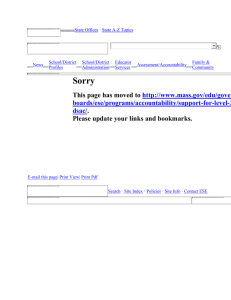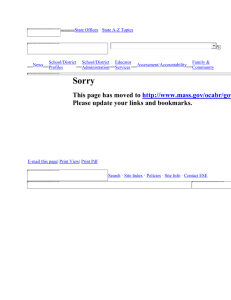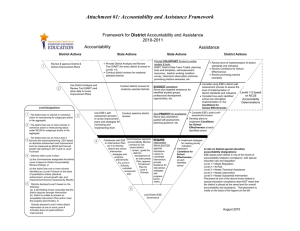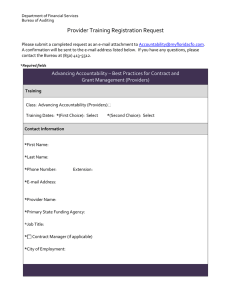2016 0113Notes
advertisement
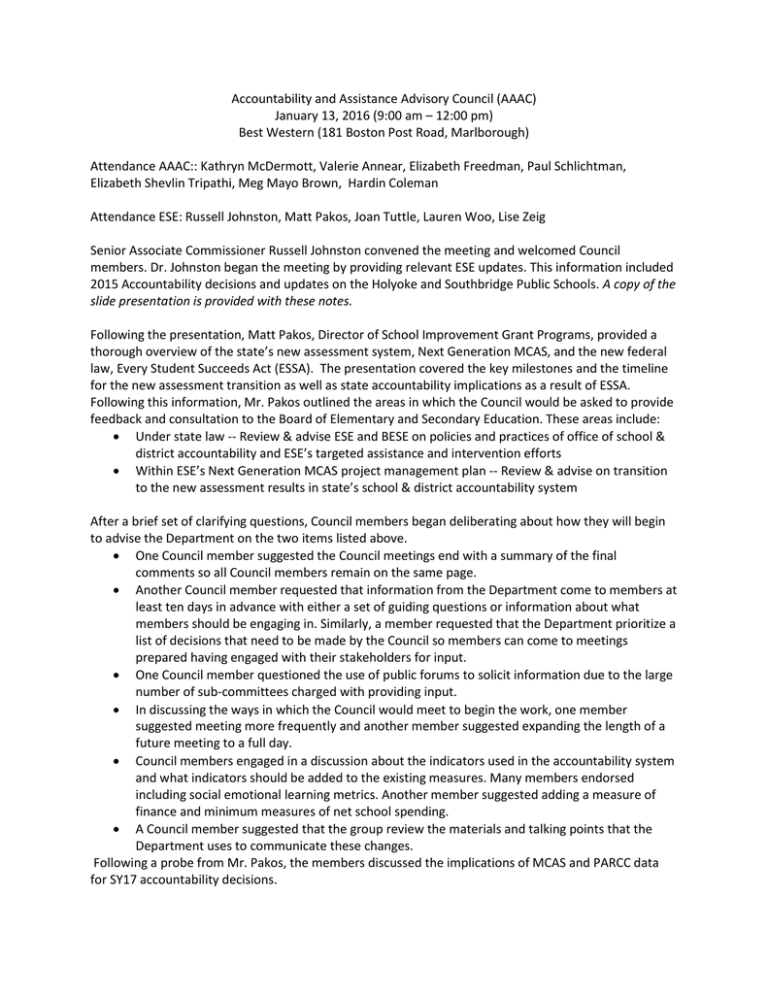
Accountability and Assistance Advisory Council (AAAC) January 13, 2016 (9:00 am – 12:00 pm) Best Western (181 Boston Post Road, Marlborough) Attendance AAAC:: Kathryn McDermott, Valerie Annear, Elizabeth Freedman, Paul Schlichtman, Elizabeth Shevlin Tripathi, Meg Mayo Brown, Hardin Coleman Attendance ESE: Russell Johnston, Matt Pakos, Joan Tuttle, Lauren Woo, Lise Zeig Senior Associate Commissioner Russell Johnston convened the meeting and welcomed Council members. Dr. Johnston began the meeting by providing relevant ESE updates. This information included 2015 Accountability decisions and updates on the Holyoke and Southbridge Public Schools. A copy of the slide presentation is provided with these notes. Following the presentation, Matt Pakos, Director of School Improvement Grant Programs, provided a thorough overview of the state’s new assessment system, Next Generation MCAS, and the new federal law, Every Student Succeeds Act (ESSA). The presentation covered the key milestones and the timeline for the new assessment transition as well as state accountability implications as a result of ESSA. Following this information, Mr. Pakos outlined the areas in which the Council would be asked to provide feedback and consultation to the Board of Elementary and Secondary Education. These areas include: Under state law -- Review & advise ESE and BESE on policies and practices of office of school & district accountability and ESE’s targeted assistance and intervention efforts Within ESE’s Next Generation MCAS project management plan -- Review & advise on transition to the new assessment results in state’s school & district accountability system After a brief set of clarifying questions, Council members began deliberating about how they will begin to advise the Department on the two items listed above. One Council member suggested the Council meetings end with a summary of the final comments so all Council members remain on the same page. Another Council member requested that information from the Department come to members at least ten days in advance with either a set of guiding questions or information about what members should be engaging in. Similarly, a member requested that the Department prioritize a list of decisions that need to be made by the Council so members can come to meetings prepared having engaged with their stakeholders for input. One Council member questioned the use of public forums to solicit information due to the large number of sub-committees charged with providing input. In discussing the ways in which the Council would meet to begin the work, one member suggested meeting more frequently and another member suggested expanding the length of a future meeting to a full day. Council members engaged in a discussion about the indicators used in the accountability system and what indicators should be added to the existing measures. Many members endorsed including social emotional learning metrics. Another member suggested adding a measure of finance and minimum measures of net school spending. A Council member suggested that the group review the materials and talking points that the Department uses to communicate these changes. Following a probe from Mr. Pakos, the members discussed the implications of MCAS and PARCC data for SY17 accountability decisions. One member discussed the importance of looking at specific standards-based data to make year to year instructional decisions. Another member also cautioned using high level metrics to drive decisions. Another member cautioned the Department from moving away from using multiple years of data to drive accountability decisions since this method has been used in the past to make serious school and district accountability decisions. A member urged the Department to release the data earlier so schools have the opportunity to use the data to drive school planning and summer professional development. The members discussed whether to include SY16 MCAS data when looking at trends over time – no consensus was reached, and the group requested more data to inform their opinions. Dr. Johnston closed out the meeting by reiterating that while this meeting was focused on process, the following meetings would be focused on outcomes. Going forward, the Department has committed to laying out a timeline and goals at least 10 days in advance of each AAAC meeting. Following this meeting, the Council will devote the April 6th meeting to a working session in order for the members to begin to come to a consensus around recommendations. The Council also agreed to consider engaging in a full-day planning session over the summer in order to more deeply dive into the work. Finally, the Council agreed that meeting notes would include a summary statement describing what, if any, consensus was reached.
